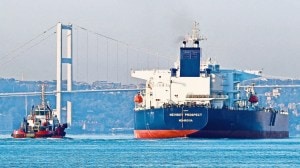Centre says cant give any more coal to Karnataka,MP
The NDA-ruled states of Karnataka and Madhya Pradesh are unlikely to gain any respite on their power production front...
The NDA-ruled states of Karnataka and Madhya Pradesh are unlikely to gain any respite on their power production front with the Centre making it clear that the demand by these states for additional coal linkage cannot be entertained in view of the resource constraints.
Speaking to The Indian Express,coal minister Sriprakash Jaiswal said,Madhya Pradesh chief minister Shivraj Chouhan had met me and sought additional coal supply to meet the needs of the states power plants. I am not sure how we would treat it as we have resource constraints. I suggested that Madhya Pradesh should bear with us for the time being.
Under the existing coal import norms,the coastal states have been mandated to import 30 per cent of their total production needs,while landlocked states have been told to import 10 per cent. Now,this too is unviable as infrastructure constraints,freight and transport charges nullify the gain accrued from imports. Chauhan had also sought Prime Minister Manmohan Singhs intervention a couple of months ago for adequate release of coal to Madhya Pradesh.
The central Indian state has been facing a shortage of over 2,500 MW due to scarcity of coal. Chouhan has already criticised the Centre for slashing coal supply from the required 1.5 MT to 1.2 MT. He added that the states Sarni thermal power station was facing critical coal stock position that has created power shortage. The chief minister is understood to be reluctant to import coal arguing that his state has sufficient coal reserves in its southern-eastern belt. Sarnis coal quota has been reduced from 661,000 tonne to 575,000 tonne,while that of Birsinghpur power plant has been slashed to 570,000 tonne from 680,000 tonne.
Similarly Karnataka is also plagued by coal shortage with its power plants facing a critical coal stock position. The state government is keen to secure additional coal quota from the Centre to fire its thermal power plants. The country has been able to add only 3,453 MW in 2008-09 against a target of 11,061 MW. The growing gap between coal demand and production,which is likely to widen to 49 MT by 2012,is also forcing companies to look abroad.



- 01
- 02
- 03
- 04
- 05




























